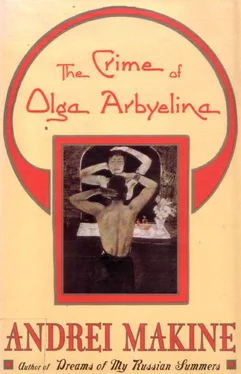The start of this chronology went back to the revolution, to the civil war, to the flight across a Russia set ablaze by the Bolsheviks. Next for them had come the period of putting down roots in Paris, in Nice, or, for some, in the sleepy monotony of Villiers-la-Forêt. Later, in 1924, came the terrible decision by the French to recognize the Soviet Union. In 1932, worse still: the Russian émigré Pavel Gorgulov assassinates the President, Paul Doumer! For several weeks the whole Russian part of the town had lived in fear of reprisals… Then the war had broken out and, paradoxically, had somewhat rehabilitated them in the eyes of the French-thanks to the victory of those same Bolsheviks over Hitler… And finally this latest event, this incredible coupling of the Princess Arbyelina with the ridiculous Golets.
This woman had made her mark on the Russian chronology of Villiers-la-Forêt by the simple fact of moving into the town in the spring of 1939. From the first day the emigres had begun to look forward to a marvelous transformation, such as a princess must inevitably give rise to in their lives. They already knew that Olga Arbyelina belonged to one of the most illustrious families in Russia and bore the name of her husband, a certain Georgian prince who had recently abandoned her, leaving her alone, without means, and with a young child on her hands. Making her welcome among them all, people of modest origins, seemed to them like a kind of revenge on the Parisian diaspora, who took such a pride in their titles, arrogant and exclusive. They had a fleeting dream of figuring in a poignant melodrama, The Exiled Princess … But this princess seemed to be showing a poor grasp of her role. She appeared not to be suffering from her relegation to Villiers, lived as modestly as themselves, and treated them with disappointing simplicity. They would have preferred her haughty; they would have liked to pardon her the pride of her caste; they were ready to share her loathing for the new masters of Russia! But she remained very discreet on the subject and had apparently even observed one day, to the great displeasure of the elderly inmates of the Russian retirement home, "The revolution was conceived not so much in the mud of the workers' districts as in the filth of the palaces…"
There was yet more intense disappointment in store for them: her child's illness. Or rather the calm with which the princess endured it. In the minds of the Russian colony the word "hemophilia" had evoked the shade of the unfortunate Tsarevich. Everyone began to seek out some dynastic mystery; one by one the pensioners reeled off the names of those descendants of Queen Victoria guilty of introducing the scourge into so many noble houses. They expected an almost immediate tragedy: they were already decking out the Princess Arbyelina in the mourning of an inconsolable mother. But when one of them very circumspectly (with that studied circumspection that is worse than any tactlessness) alluded to this British lineage, Olga had replied, almost laughing, "No, no, we didn't need the Queen to bestow this treasure on us." Moreover, her child's case did not seem to be as serious, by a long shot, as the illness that had dogged the Tsar's son. And to crown it all, the boy showed no particular signs of suffering and spoke so little that he could easily have been taken for mute…
Thus the miracle they had all been looking forward to went no further than the considerable enhancement of the library, of which the princess was now in charge, and the planting of a service tree by the front steps to the strange house where she alone had agreed to reside, the long redbrick annex, built against the "wall of the former brewery in which the émigrés had made their home at the start of the twenties, dividing it up into apartments, a retirement home, a reading room, a canteen… Yes, she had disappointed them cruelly!
However, none of these frustrations could match the latest one: her farcical assignation with this… someone recalled at that moment that Golets had worked as a horse butcher. With this horse butcher, then, who, no doubt so as to make them a laughingstock, had had the stupidity to get drowned!
The hypotheses advanced by the people of Villiers clearly erred on the side of unsubtlety. Where death is involved the seething mass of detail is obliterated and only the broad outline of human appearances is preserved. Thus sometimes Golets became "that dreary old Russian," sometimes "that horse butcher," and occasionally "the ex-officer." Princess Arbyelina's friend (one of his letters was said to have been found, signed "L.M.") was "a well known poet and journalist but afraid of his wife and of the wagging tongues of the émigrés in Paris." And Olga's husband "a hell of a fellow, a hero in spite of himself, a Georgian Don Juan." Death, like a harsh spotlight, picked out these three profiles-simplified but perhaps tolerably accurate, when all's said and done: the husband, the lover, and the suitor, as the apprentice detectives of Villiers-la-Forêt called them.
In the course of the inquiry the services of an interpreter, a Russian, had to be called on. And it was probably he who was responsible for several leaks, which the citizens were not slow to weave into their own fabrications. The rumors disclosed in this way seemed credible enough, in any case, and would be even more so when the affair was closed. One of them was quoted more often than the others. In passing it on they presented it in dialogue form, for greater authenticity:
"So you claim you always wished for the death of Monsieur Golets?"
"Yes, I did not intend to let a man like that remain alive."
"Can you tell me at what moment the idea of killing him came to you?"
"It was when he forced me to take a walk with him in the park."
"How could he force you to do it?"
"He knew that I would obey him…"
And from this point the theories gushed forth in all directions, suggesting a thousand and one conceivable motives for the mysterious hold Golets had over Olga Arbyelina.
It also occurred that during the passionate debates at the Café Royal or under the poplar trees on the marketplace, someone would attempt to win credence for a completely far-fetched invention. According to one of these forgers the Russian princess had described her relationship with the horse butcher in these Delphic terms: "This man was an amalgam of all the ugliness in the world, while I was living at one with the beauty of last winter. I still had before my eyes the imprint of a hand on the windowpane, amid the hoarfrost flowers…"
And what was most surprising was the extent to which this remark, doubtless invented from a lot of scraps, also nourished very reasonable suppositions. So who had left this imprint? The Parisian lover, the shadowy L.M.? Or an unknown person whose existence the investigator had failed to reveal? As for the readers at the Russian library, they interpreted this strange remark as a sign of incipient madness. "Oh, you know," the elderly inmates of the retirement home would exclaim. "The princess hasn't been all there for some time now."
In these tangled webs of personal interpretation there was, however, one matter that intrigued all the people of Villiers-la-Forêt equally, whether they were French or Russian: the impossibility of picturing the bodies of the two protagonists of the tragedy in carnal union. Their bodies were so physically incompatible. Such an act of love-for many of them almost against nature-led in their conversations, particularly among the men, to this disconcerting question, which subsequently spread through the town: "How could she give herself to him?" Which was, of course, the expurgated version of what they actually said…
Apart from that, picturing the Princess Arbyelina in the arms of this squat, bold, ungainly Russian allowed the men of Villiers-la-Forêt to have a kind of revenge on the woman. Most of them experienced jealous regret: this creature with her statuesque body must have been an easy catch, after all, given that this moujik had wooed her with such success! The bitterest of them harped on the fact that the woman was forty-six… thrusting her utterly inaccessible body toward old age, toward the unattractiveness of old age. Men can be pitiless toward a woman whose body has eluded them, particularly if this is thanks to their own cowardice.
Читать дальше












